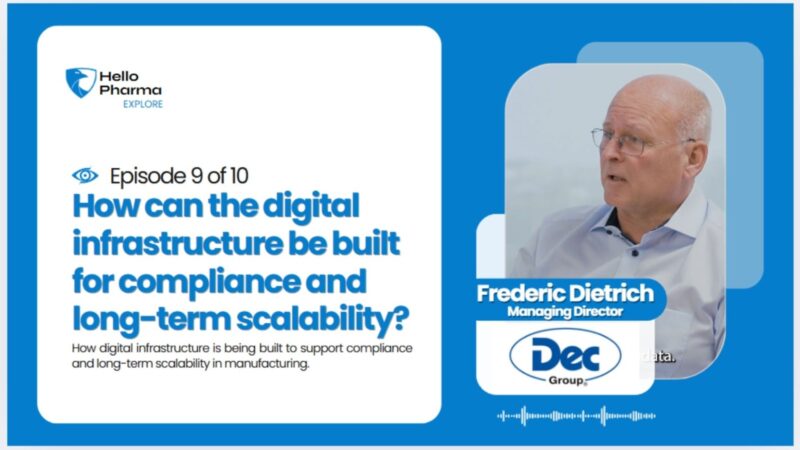Digital infrastructure has become a cornerstone of modern pharmaceutical manufacturing, supporting everything from real-time process monitoring to regulatory compliance and long-term scalability. In Episode 9, we explore how digital tools and data-driven strategies are transforming the way manufacturers design, operate, and optimize their production environments.
Joining us is Mr Frederic Dietrich, Managing Director of Dec Group, who shares his perspective on how digitalization is reshaping the pharmaceutical landscape. The episode begins by discussing the key drivers for digital transformation, including the need for enhanced process control, data integrity, and operational efficiency.
One of the central themes is the role of digital infrastructure in supporting regulatory compliance. Mr Dietrich explains how advanced data capture and monitoring systems provide a robust foundation for meeting requirements outlined in global standards like GMP and the EU’s Annex 1. Real-time data streams enable manufacturers to detect deviations early, implement corrective actions quickly, and generate comprehensive documentation to demonstrate compliance.
Beyond regulatory alignment, digital tools are enabling manufacturers to achieve new levels of process consistency and quality. Sensors, process analytical technology (PAT), and advanced control systems provide real-time feedback on critical parameters, allowing for proactive adjustments and reducing variability across production runs. Mr Dietrich highlights how these capabilities support not only current compliance needs but also the flexibility to adapt to future regulatory updates.
The conversation also explores how digital infrastructure underpins scalability and long-term operational agility. As product portfolios evolve and demand fluctuates, manufacturers need systems that can quickly adapt without significant reengineering. Mr Dietrich discusses how modular data architectures and integrated software platforms allow manufacturers to add or reconfigure production capabilities efficiently, supporting both incremental expansion and full-scale facility upgrades.
Cybersecurity and data integrity are also critical considerations. Mr Dietrich touches on the importance of robust data governance frameworks, ensuring that digital systems are not only capable of capturing data but also protecting it against unauthorized access and maintaining its reliability over time.
Looking ahead, digital infrastructure will be essential to integrating emerging technologies like continuous manufacturing and advanced robotics. By providing the backbone for these innovations, digital systems help manufacturers move from reactive quality control to proactive, data-driven process optimization. Mr Dietrich shares how manufacturers can leverage pilot programs and digital twins to validate new approaches before scaling them up to full production, reducing risk and enhancing confidence in continuous improvement.
The episode concludes by emphasizing that digital transformation is not just a technological upgrade—it is a strategic shift that empowers manufacturers to operate more efficiently, ensure compliance, and build future-ready processes that can adapt to new challenges and opportunities.
Join us as we unpack the role of digital infrastructure in shaping the future of pharmaceutical manufacturing and explore how data-driven practices are setting new standards for safety, quality, and operational excellence.
For more in-depth resources and insights on pharmaceutical processing and manufacturing technologies, visit www.hello-pharma.com.






